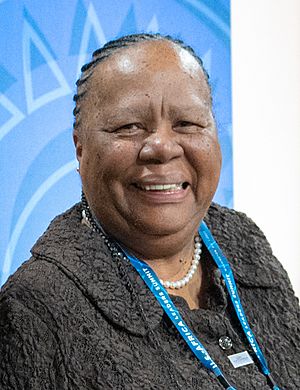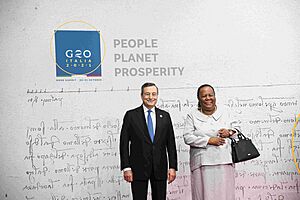Naledi Pandor facts for kids
Quick facts for kids
Naledi Pandor
|
|
|---|---|

Pandor in 2022
|
|
| Minister of International Relations and Cooperation | |
| In office 30 May 2019 – 30 June 2024 |
|
| President | Cyril Ramaphosa |
| Deputy | Alvin Botes Candith Mashego-Dlamini |
| Preceded by | Lindiwe Sisulu |
| Succeeded by | Ronald Lamola |
| Minister of Higher Education and Training | |
| In office 27 February 2018 – 29 May 2019 |
|
| President | Cyril Ramaphosa |
| Deputy | Buti Manamela |
| Preceded by | Hlengiwe Mkhize |
| Succeeded by | Blade Nzimande (Higher Education, Science and Technology) |
| Minister of Science and Technology | |
| In office 26 May 2014 – 26 February 2018 |
|
| President | Jacob Zuma Cyril Ramaphosa |
| Deputy | Zanele kaMagwaza-Msibi |
| Preceded by | Derek Hanekom |
| Succeeded by | Mmamoloko Kubayi-Ngubane |
| In office 10 May 2009 – 4 October 2012 |
|
| President | Jacob Zuma |
| Deputy | Zanele kaMagwaza-Msibi |
| Preceded by | Mosibudi Mangena |
| Succeeded by | Derek Hanekom |
| Minister of Home Affairs | |
| In office 2 October 2012 – 25 May 2014 Acting: 2 October 2012 – 4 October 2012 |
|
| President | Jacob Zuma |
| Deputy | Fatima Chohan |
| Preceded by | Nkosazana Dlamini-Zuma |
| Succeeded by | Malusi Gigaba |
| Minister of Education | |
| In office 12 May 2004 – 10 May 2009 |
|
| President | Thabo Mbeki Kgalema Motlanthe |
| Deputy | Enver Surty |
| Preceded by | Kader Asmal |
| Succeeded by | Angie Motshekga (Basic Education) Blade Nzimande (Higher Education and Training) |
| 2nd Chairperson of the National Council of Provinces | |
| In office 21 June 1999 – 4 May 2004 |
|
| President | Thabo Mbeki |
| Preceded by | Mosiuoa Lekota |
| Succeeded by | Joyce Kgoali |
| Personal details | |
| Born |
Grace Naledi Mandisa Matthews
7 December 1953 Durban, Union of South Africa |
| Political party | African National Congress |
| Spouse | Sharif Pandor |
| Children | 4 |
| Relatives |
|
| Education | University of Swaziland (BA) University of Botswana (BA) University of London (MA) Stellenbosch University (MA) University of Pretoria (PhD) |
| Scientific career | |
| Thesis | Contested meanings of transformation in higher education in post-apartheid South Africa |
| Occupation |
|
Grace Naledi Mandisa Pandor (born 7 December 1953) is a well-known South African politician and educator. She served as the Minister of International Relations and Cooperation from 2019 until June 2024. She was also a Member of Parliament (MP) for the African National Congress (ANC) from 1994 to 2024.
Naledi Pandor was born in Durban. She finished high school in Botswana. She became a teacher and taught at many schools and universities. She also earned several degrees from different universities. Pandor became a Member of Parliament in 1994. She quickly became a leader within the ANC party in Parliament. She was elected Deputy Chairperson of the National Council of Provinces in 1998 and became its Chairperson in 1999.
She first joined the national government as a minister in 2004. President Thabo Mbeki appointed her as Minister of Education. She kept this job when Kgalema Motlanthe became president. In 2009, President Jacob Zuma made her Minister of Science and Technology. She held this role until 2012, when she became Minister of Home Affairs. She returned to the Science and Technology role in 2014. In 2018, she became Minister of Higher Education and Training under President Cyril Ramaphosa. After the 2019 election, Pandor was appointed Minister of International Relations and Cooperation. She did not win re-election to Parliament in 2024.
Contents
Early Life and Education
Grace Naledi Mandisa Matthews was born on 7 December 1953 in Durban, Natal. Her parents were Regina Thelma and Joe Matthews. Her father was a political activist who worked against apartheid. Her grandfather was the academic Z. K. Matthews. Naledi Pandor went to primary and secondary school in Botswana. She finished high school at Gaborone Secondary School.
Between 1973 and 1977, she earned a certificate and a bachelor's degree from the University of Swaziland and the University of Botswana. She then studied overseas, earning a diploma and a Master of Arts (MA) degree from the University of London between 1978 and 1979.
Pandor continued her studies, earning a diploma in higher education leadership in 1992. She also studied at Harvard Kennedy School in 1997. In the same year, she earned another MA degree in linguistics from the University of Stellenbosch. In 2019, Pandor received her PhD in education from the University of Pretoria. Her PhD research was about changes in higher education in South Africa after apartheid.
Teaching Career and Leadership Roles
Naledi Pandor started her teaching career in London in 1980. She then taught in Gaborone from 1981 to 1984. She also worked as an instructor at the Taung College of Education. From 1986 to 1989, Pandor was a senior lecturer in English at the University of Bophuthatswana. Later, she was a senior fellow at the University of Cape Town from 1989 to 1994.
While at the University of Bophuthatswana, Pandor led the university's staff union. She also chaired the Western Cape National Executive Committee of the National Education Coordinating Committee from 1991 to 1993. During this time, she was part of the ANC's education committee in the Western Cape.
Pandor also led the ANC Athlone Central branch. She was in charge of the Desmond Tutu Education Trust and the Western Cape School Building Trust. From 1992 to 1995, she was the deputy head of the Tertiary Education Fund of South Africa. She later became the head of this fund. She also served as deputy chairperson of the Joint Education Trust Board of Trustees from 1993 to 2001. From 2002 to 2004, she was the chancellor of Cape Technikon. She was also a member of the governing council of the University of Fort Hare.
Early Political Career
Pandor became a Member of Parliament in the National Assembly after the 1994 general election. This was South Africa's first democratic election. She served as Deputy Chief Whip for the ANC from 1995. In 1998, she moved to the National Council of Provinces, which is the upper house of Parliament.
She became the Deputy Chairperson there. After the 1999 general election, she was appointed Chairperson of the National Council of Provinces on 21 June 1999. She was the first woman to hold this important position. Joyce Kgoali took over from Pandor in 2004.
Serving in National Government
Minister of Education (2004–2009)
After the 2004 general election, Pandor returned to the National Assembly. President Thabo Mbeki appointed her as Minister of Education on 12 May 2004. In this role, she worked to improve South Africa's education system. She made changes to the country's education approach. When President Mbeki resigned in 2008, Kgalema Motlanthe became president. He kept Pandor in her role as Minister of Education.
Minister of Science and Technology (2009–2012)
After the 2009 general election, Jacob Zuma became the new President of South Africa. He divided the Education Ministry into two new departments. In May 2009, he appointed Pandor as the new Minister of Science and Technology. During her time in this job, Pandor played a key role in South Africa's successful bid to host the Square Kilometre Array (SKA) telescope in the Karoo region.
Minister of Home Affairs (2012–2014)
In October 2012, Nkosazana Dlamini-Zuma resigned as Minister of Home Affairs. She left to become the Chair of the African Union. President Zuma then appointed Pandor as the acting Minister of Home Affairs on 2 October 2012. Two days later, on 4 October 2012, she was formally appointed to the position. In October 2013, she even served as acting president for one day while President Zuma was traveling.
Minister of Science and Technology (2014–2018)
After the 2014 general election, President Zuma announced that Pandor would return to lead the Department of Science and Technology. Malusi Gigaba took over as Minister of Home Affairs. Pandor started her new term on 26 May 2014.
Minister of Higher Education and Training (2018–2019)
Cyril Ramaphosa became President in February 2018. Pandor was appointed Minister of Higher Education and Training on 27 February 2018. She took over from Hlengiwe Mkhize.
Minister of International Relations and Cooperation (2019–2024)
After the 2019 general election, the Ministry of Higher Education and Training was divided. Pandor was appointed Minister of International Relations and Cooperation and started her role on 30 May 2019.
In response to the 2022 conflict in Ukraine, Pandor and her department initially called for Russia to withdraw its forces. She later adjusted her position to align with South Africa's view that negotiations were needed to end the conflict. On 10 March 2022, Pandor supported the idea of a single African currency to boost trade within Africa.
In September 2022, Pandor represented President Ramaphosa at the Seventy-seventh session of the United Nations General Assembly. In her speech, Pandor said that all conflicts around the world should receive equal attention. She also called for accountability for actions in the Israeli–Palestinian conflict. She asked for sanctions against Cuba and Zimbabwe to be lifted.

Regarding the International Criminal Court (ICC) arrest warrant for Vladimir Putin, Pandor stated that the ICC should have a fair approach to all leaders. South Africa invited Russian President Vladimir Putin to the 15th BRICS Summit in August 2023. In May 2023, Pandor approved diplomatic immunity for Vladimir Putin and his officials to attend the summit.
Pandor has been vocal about the situation in Israel. Following the October 7th attack on Israel, Pandor had a phone call with a Hamas leader. On 12 November 2023, Pandor called for the International Court of Justice (ICJ) to speed up its investigation into the situation in Gaza. She also stated that she expected the ICC to issue an arrest warrant for Israeli Prime Minister Benjamin Netanyahu.
Pandor lost her seat in Parliament in the 2024 general election.
Personal Life
Naledi Pandor is married to Sharif Joseph Pandor. They met while she was studying in Botswana. They have four children together. She converted to Islam after she met her husband. Her husband's family gave her the Islamic name Nadia. Pandor has said that her parents supported her conversion, believing that "God is God" and that Islamic principles are universal.
See also
 In Spanish: Naledi Pandor para niños
In Spanish: Naledi Pandor para niños
 | Delilah Pierce |
 | Gordon Parks |
 | Augusta Savage |
 | Charles Ethan Porter |


